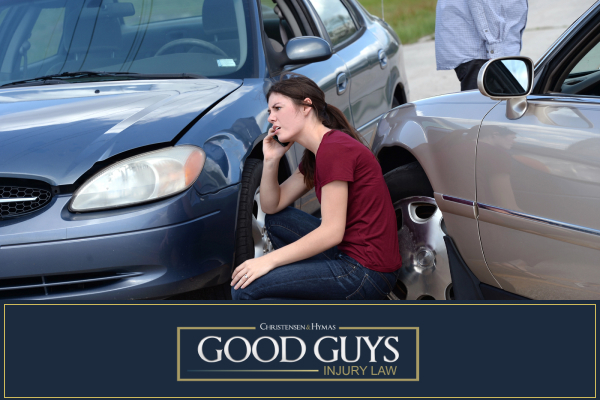
A car accident can cause serious injuries, vehicle damage, and financial stress. Many car accident victims struggle to pay medical bills, recover lost income, and deal with emotional trauma. Settlements help cover these losses, but the amount varies for each case.
Good Guys Injury Law helps accident victims understand their legal rights. The value of a car accident claim depends on many factors, including medical expenses, lost income, and pain and suffering damages. Insurance companies use different methods to calculate payments, and some try to offer less than victims deserve.
Knowing how settlements work can help you get fair compensation. We will explain what affects the car accident settlement amounts, what damages you can recover, and how lawyers calculate payouts. Understanding these details can help you maximize your claim and protect your rights.
Table of Contents
Methods for Calculating Car Accident Settlements
There is no fixed amount for a car accident settlement. Each car accident case is different, so settlements are calculated based on specific details. Insurance companies use different methods to determine compensation for medical expenses, lost income, and pain and suffering damages.
Understanding these methods can help car accident victims estimate their claim’s value and ensure they receive a fair payout.
The Multiplier Method
The multiplier method is one of the most common ways to calculate car accident settlements. It works by adding up all economic damages, such as medical bills, lost wages, and vehicle repair costs, and multiplying them by a number (usually between 1.5 and 5).
The multiplier depends on the severity of injuries and how much the accident affects the victim’s life. If injuries are minor, the multiplier is lower. If injuries cause long-term pain, disability, or emotional trauma, the multiplier is higher.
For example, if medical expenses and lost wages total $20,000 and the multiplier is 3, the estimated settlement would be $60,000. A lawyer can help negotiate a fair multiplier based on the circumstances of the car accident case.
The Per Diem Method
The per diem method calculates pain and suffering damages by assigning a daily dollar amount for the victim’s recovery period. This amount is multiplied by the number of days the victim experiences physical pain and suffering.
For example, if the daily rate is $200 and the victim suffers for 150 days, the pain and suffering claim would be worth $30,000. The daily amount is usually based on the victim’s daily earnings or a reasonable estimate of the suffering endured.
This method works best for injuries with a clear recovery timeline. If a victim has permanent injuries, the multiplier method may be more accurate.
Using Insurance Settlement Calculators
Some insurance companies and law firms use settlement calculators to estimate car accident settlement amounts. These calculators factor in medical bills, lost wages, pain and suffering, and other damages.
While settlement calculators provide estimates, they do not always account for the full impact of an accident. They rely on standard formulas, but they may not consider future medical needs, long-term emotional distress, or reduced quality of life.
Victims should not rely solely on a calculator when negotiating with an insurance company. Consulting an experienced personal injury attorney ensures that all damages are considered before accepting a settlement offer.
Key Factors That Affect Car Accident Settlements

The amount of a car accident settlement depends on several factors. Each car accident case is unique, so insurance companies look at specific details before offering compensation. These details determine how much a victim can receive for medical bills, lost income, and pain and suffering damages.
Understanding these factors can help car accident victims estimate their claim’s value and fight for fair compensation. Some of the most important elements that affect a settlement are:
Liability and Fault Determination
One of the biggest factors in a car accident claim is proving who caused the crash. The at-fault driver is usually responsible for paying damages through their insurance company. If fault is unclear, the settlement process can take longer.
Insurance companies look at police reports, witness statements, and accident scene photos to decide fault. In some cases, both drivers share responsibility. This is called comparative negligence, and it can reduce the victim’s payout. If a victim is found partially at fault, their settlement may be lower.
A lawyer can help gather evidence to prove fault. The stronger the proof, the better the chances of securing a fair settlement.
Severity of Injuries
Serious injuries lead to higher car accident settlement amounts. Victims with severe injuries need more medical treatment, longer recovery times, and sometimes lifelong care. These cases often involve higher medical expenses and greater pain and suffering damages.
Minor injuries like cuts or bruises may result in lower settlements. However, conditions like broken bones, spinal injuries, or traumatic brain injuries require extensive care. These types of injuries increase the value of a car accident case.
Insurance companies also consider future medical needs. If a victim needs physical therapy, surgery, or long-term care, these costs are factored into the settlement.
Property Damage and Vehicle Repairs
The cost of vehicle repair is another major factor in a car accident claim. Insurance companies assess the damage to determine whether the car can be repaired or if it is a total loss. If the cost to fix the vehicle is more than its value, the insurance company may declare it totaled.
In that case, the settlement should cover the car’s market value before the crash. Property damage claims also include compensation for damaged personal items inside the car. Phones, laptops, and other belongings may be included in the final payout.
Available Insurance Coverage
The insurance company of the at-fault driver is responsible for paying damages. However, if the at-fault driver has low liability coverage, the victim may not receive full compensation. In these situations, car accident victims may file claims through their own insurance company if they have uninsured/underinsured motorist coverage.
This type of car insurance helps cover losses when the at-fault driver does not have enough insurance coverage to pay for damages. A lawyer can help review car insurance policies to ensure victims receive the full amount they deserve. If insurance companies try to undervalue claims, legal action may be necessary.
Types of Compensation in Car Accident Settlements
A car accident settlement covers different types of losses. The amount a victim receives depends on the damages suffered. Some damages, like medical expenses and lost income, have clear dollar amounts. Others, like pain and suffering, are harder to calculate.
Understanding these types of compensation can help car accident victims estimate their settlement and fight for fair payment.
Economic Damages (Measurable Losses)
Economic damages cover financial losses that result from the accident. These are easy to calculate because they have a set cost.
Common economic damages include:
- Medical bills – Covers emergency care, doctor visits, hospital stays, and medical treatment like surgery or medication.
- Lost wages – Compensates for income lost due to injury. If a victim cannot work temporarily or permanently, this is factored into the settlement.
- Physical therapy – Pays for rehabilitation costs needed to recover from injuries.
- Vehicle repair – Covers the cost of fixing or replacing a damaged car.
Victims should keep records of all expenses to prove their claim. These damages help cover both past and future costs.
Non-Economic Damages (Pain and Suffering)
Non-economic damages cover losses that do not have a clear dollar amount. These damages compensate for the emotional and physical toll of the accident.
Examples of non-economic damages include:
- Pain and suffering – Covers ongoing physical pain and discomfort caused by injuries.
- Emotional distress – Accounts for mental health effects, such as anxiety, depression, or trauma.
- Physical and emotional pain – Includes both long-term discomfort and the mental impact of serious injuries.
Since these losses are harder to measure, insurance companies use different methods to calculate them. A lawyer can help ensure victims receive a fair pain and suffering claim.
Punitive Damages (In Cases of Gross Negligence)
Punitive damages are awarded in cases where the at-fault driver acted recklessly. Unlike economic damages and non-economic damages, these payments are meant to punish the driver and prevent similar behavior.
Punitive damages may apply if the accident was caused by:
- Drunk driving
- Intentional harm
- Extreme negligence
Not every car accident case qualifies for punitive damages. Courts only award them in severe cases where the at-fault driver showed reckless disregard for safety.
Steps to Maximize Your Car Accident Settlement

The amount a victim receives in a car accident settlement depends on the strength of their claim. Insurance companies often try to pay as little as possible. Victims who take the right steps can increase their chances of receiving fair compensation.
Gather Strong Evidence
A car accident claim is stronger when there is clear proof of damages and fault. Victims should collect as much evidence as possible, starting at the accident scene. This includes photos of vehicle damage, injuries, road conditions, and any visible traffic signs.
The police report is also critical. It provides an official account of what happened and may include statements from witnesses. Keeping records of medical bills, medical treatment, lost income, and repair estimates will also help prove the value of the claim.
The more evidence available, the harder it is for the insurance company to deny or undervalue the claim. A lawyer can help organize and present this evidence in a way that maximizes the settlement amount.
Avoid Quick Settlement Offers
Insurance companies often offer quick settlements soon after a car accident. While this may seem helpful, these early offers are usually much lower than what victims deserve. Accepting a settlement too soon can leave victims without enough money to cover future medical expenses or lost wages.
Before agreeing to any offer, victims should fully understand their injuries and potential long-term costs. Some injuries may require ongoing medical treatment or physical therapy, which should be included in the settlement amount.
A lawyer can review any settlement offer and determine if it is fair. If the amount is too low, they can negotiate for a better payout. Once a settlement is accepted, victims cannot request more money later, even if they have unexpected medical bills or complications.
Work with a Personal Injury Lawyer
Hiring an experienced personal injury attorney is one of the best ways to secure a fair settlement. A lawyer understands how insurance companies operate and can fight for maximum compensation.
An attorney will:
- Handle all communication with the insurance company to prevent unfair tactics.
- Gather strong evidence to support the car accident claim.
- Negotiate for full compensation, including pain and suffering damages and future expenses.
Victims who try to handle their claims alone may not receive the full amount they deserve. A lawyer increases the chances of a fair settlement and protects the victim’s rights throughout the process.
FAQs
How is an average car accident settlement calculated?
There is no fixed auto accident settlement formula, but insurance companies consider several factors. These include the severity of injuries, medical bills, lost wages, and pain and suffering damages. More serious injuries, like permanent disabilities or bodily injury, lead to higher settlements. Some settlements use the multiplier method or per diem method to estimate compensation. A lawyer can help ensure all losses are included in the settlement.
What damages can I recover in a personal injury claim?
A personal injury claim can cover both economic and non-economic damages. Economic damages include medical expenses, lost income, and vehicle repair costs. Non-economic damages include pain and suffering, emotional distress, and loss of enjoyment of life. In some cases, punitive damages may also apply if the at-fault driver acted recklessly.
How long does it take to settle a personal injury case?
The time to settle a personal injury case depends on the complexity of the claim. If liability is clear and injuries are minor, a car accident settlement may take a few months. However, cases involving severe bodily injury, disputes over fault, or negotiations with the insurance company may take longer. Some cases require filing a personal injury lawsuit, which can extend the timeline.
Can I still receive compensation if I was partially at fault?
Yes, but the amount you receive may be reduced. Many states follow comparative negligence rules, meaning your settlement is adjusted based on your share of fault. For example, if you are found 20% at fault, your car accident settlement will be reduced by 20%. An attorney can help prove the at-fault driver was primarily responsible to maximize your compensation.
Do I need a lawyer for a personal injury claim?
While it is possible to handle a claim alone, working with a personal injury attorney increases the chances of a fair auto accident settlement. Insurance companies often offer low initial settlements, hoping victims accept less than they deserve. A lawyer can negotiate for full compensation, ensure all damages are included, and take legal action if necessary.
Contact Our Skilled Car Accident Lawyer for a Free Consultation

A car accident can cause serious injuries, financial stress, and long-term complications. Many car accident victims struggle with medical expenses, lost income, and ongoing pain and suffering. If you were injured, you should not have to face these challenges alone.
Good Guys Injury Law fights for fair settlements in every personal injury case. Our experienced team understands personal injury law and knows how to deal with insurance companies that try to undervalue claims. Whether negotiating a car accident settlement or filing a personal injury lawsuit, we work to maximize compensation for our clients.
If you or a loved one were hurt in an accident, contact us today for a free consultation. We will review your case, explain your legal options, and help you recover the compensation you deserve.






